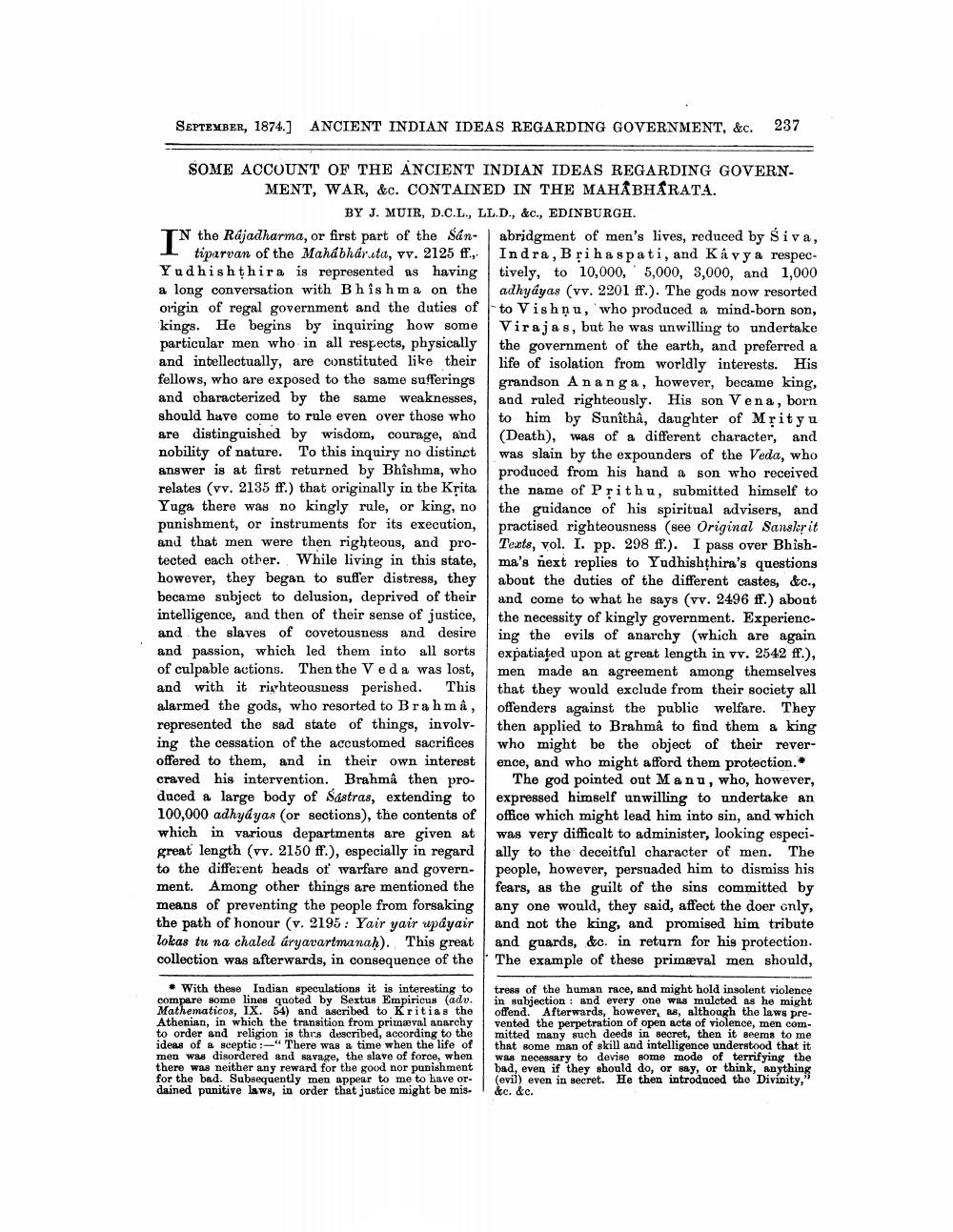________________
SEPTEMBER, 1874.] ANCIENT INDIAN IDEAS REGARDING GOVERNMENT, &c. 237
SOME ACCOUNT OF THE ANCIENT INDIAN IDEAS REGARDING GOVERN. MENT, WAR, &c. CONTAINED IN THE MAHABH RATA.
BY J. MUIR, D.C.L., LL.D., &c., EDINBURGH. TN the Rajadharma, or first part of the Sán- abridgment of men's lives, reduced by Siva, I tiparvan of the Mahábhár sta, vv. 2125 ff., Indra, Brihaspati, and Ka vya respecYudhish ţhira is represented as having tively, to 10,000, . 5,000, 3,000, and 1,000 a long conversation with Bhishma on the adhyayas (vv. 2201 ff.). The gods now resorted origin of regal government and the duties of to Vishņu, who produced a mind-born son, kings. He begins by inquiring how some | Virajas, but he was unwilling to undertake particular men who in all respects, physically the government of the earth, and preferred a and intellectually, are constituted like their life of isolation from worldly interests. His fellows, who are exposed to the same sufferings grandson Ananga, however, became king, and characterized by the same weaknesses, and ruled righteously. His son Vena, born should have come to rule even over those who to him by Sunithâ, daughter of Mrityu are distinguished by wisdom, courage, and (Death), was of a different character, and nobility of nature. To this inquiry no distinct was slain by the expounders of the Veda, who answer is at first returned by Bhishma, who produced from his hand a son who received relates (vv. 2135 ff.) that originally in the Krita the name of Prithu, submitted himself to Yuga there was no kingly rule, or king, no the guidance of his spiritual advisers, and punishment, or instruments for its execution, practised righteousness (see Original Sanskrit and that men were then righteous, and pro- Texts, vol. I. pp. 298 ff.). I pass over Bhishtected each other. While living in this state, ma's next replies to Yudhishthira's questions however, they began to suffer distress, they abont the duties of the different castes, &c., became subject to delusion, deprived of their and come to what he says (vv. 2496 ff.) about intelligence, and then of their sense of justice, the necessity of kingly government. Experiencand the slaves of covetousness and desire ing the evils of anarchy (which are again and passion, which led them into all sorts expatiated upon at great length in vv. 2542 ff.), of culpable actions. Then the Veda was lost, men made an agreement among themselves and with it righteousness perished. This that they would exclude from their society all alarmed the gods, who resorted to Brahma, offenders against the public welfare. They represented the sad state of things, involv- then applied to Brahmâ to find them a king ing the cessation of the accustomed sacrifices who might be the object of their reveroffered to them, and in their own interest ence, and who might afford them protection. craved his intervention. Brahmâ then pro- The god pointed out Manu, who, however, duced a large body of Sastras, extending to expressed himself unwilling to undertake an 100,000 adhyâyas (or sections), the contents of office which might lead him into sin, and which which in various departments are given at was very difficalt to administer, looking especigreat length (vv. 2150 ff.), especially in regard ally to the deceitful character of men. The to the different heads of warfare and govern- people, however, persuaded him to dismiss his ment. Among other things are mentioned the fears, as the guilt of the sins committed by means of preventing the people from forsaking | any one would, they said, affect the doer only, the path of honour (v. 2195: Yair yair updyair and not the king, and promised him tribute lokas tu na chaled aryavartmanah). This great and guards, &c. in return for his protection. collection was afterwards, in consequence of the The example of these primæval men should,
• With these Indian speculations it is interesting to compare some lines quoted by Sextus Empiricus (adu. Mathematicos, IX. 54) and ascribed to Kritias the Athenian, in which the transition from primæval anarchy to order and religion is thrs described, according to the ideas of a sceptic :-" There was a time when the life of men was disordered and savage, the slave of force, when there was neither any reward for the good nor punishment for the bad. Subsequently men appear to me to have or. dained punitive laws, in order that justice might be mis-
tress of the human race, and might hold insolent violence in subjection and every one was mulcted as he might offend. Afterwards, however, as, although the laws prevented the perpetration of open acts of violence, men com. mitted many such deeds in secret, then it seems to me that some man of skill and intelligence understood that it was necessary to devise some mode of terrifying the bad, even if they should do, or say, or think, anything (evil) even in secret. He then introduced tho Divinity," &c. &c.




